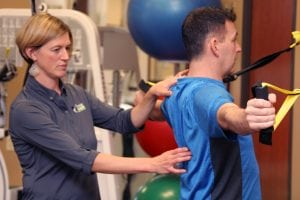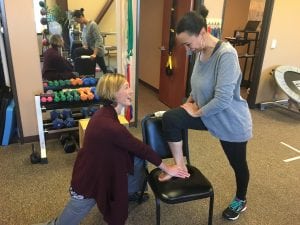When you think of physical therapy, injury or surgery rehab may come to mind. Or perhaps you’ve known someone who uses physical therapy for cumulative pain or injury prevention. But physical therapy can relieve a variety of conditions, including the six surprising conditions listed below.
-

The ways physical therapy can help are many, and sometimes surprising. Photo courtesy: Penrose & Associates. Fibromyalgia: Fibromyalgia involves being in all over body pain, particularly near joints, all of the time. Physical therapists consider the body as a whole, and have vast knowledge of the way joints, muscles and the neuro-skeleton work together. They can help patients understand what steps to take to manage pain.
- Physical Challenges of Parenthood: The transition to parenthood involves many physical challenges. A baby may prefer being held in a certain position during feeding, for instance. That means the body will maintain an abnormal posture for a prolonged duration. It is imperative to learn how to maneuver the body safely while taking care of an infant. Physical therapy can identify, alleviate, and prevent injury.
- Vertigo: By releasing the tension around the balance system in your ears and eyes, physical therapy addresses the underlying cause of vertigo and dizziness. In some cases, easy posture changes significantly reduce the uncomfortable symptoms of vertigo.
- Pediatric Conditions: Because younger children are unable to express exactly what is causing them pain (or if they are dealing with some level of injury) it is more difficult to diagnose and determine what type of care is needed. Physical therapy can provide caregivers with resources to support and care for their child and will tailor therapies to match their age, sport, and level of activity.
-

Physical therapy can relieve many different conditions, including fybromyalgia and vertigo. Photo courtesy: Penrose & Associates. Tennis elbow/wrist: Just because there is no physical contact between players during a tennis match does not mean that injuries are less likely. The repetitive motions that tennis requires such as twisting, lunging, swinging, and reaching, can lead to overuse injuries. A huge part of treatment is prevention. While tailored exercises and manual therapy will help with an injury, if the body is not conditioned to play, it is more prone to damage. Physical therapists can provide the tools to keep your body injury free.
- TMJ: Teeth grinding and clenching in the jaw, neck, or face – due to stress and posture – are the main causes of TMJ disorders. Popping and cracking in the ears, jaw joint pain, and headaches are all symptoms. With posture training and simple exercises, physical therapy can be very effective in relieving symptoms associated with TMJ.
Penrose & Associates Physical Therapy has been the Puget Sound’s trusted resource since 2007 and treats all of the conditions listed above, plus sports, lifestyle, and workplace injuries.
Sponsored











































